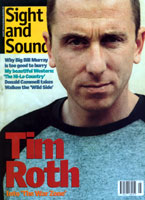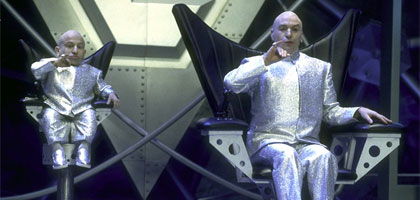Primary navigation


Its gags may be scattershot and its story flimsy, but Austin Powers The Spy Who Shagged Me gives critics the goldfinger by being more subtle than it seems, argues Xan Brooks
The opening scene in Austin Powers The Spy Who Shagged Me finds Mike Myers' wacky British agent lounging in bed watching the 1967 spy comedy In Like Flint. "My favourite movie," boasts Powers, and with that one line he jams the guns of a thousand film critics by acknowledging that, yes, the Austin Powers concept is old hat, dated, done to death. In the first place, In Like Flint was actually a sequel to Our Man Flint (1965), just as The Spy Who Shagged Me is a sequel to 1997's International Man of Mystery. And second, Flint's patented line of comedy is already over 30 years distant. Let's face it - spoofs on the espionage genre are almost as old as the genre itself. The golden age of 007 was paralleled by a host of spoofs, from Flint and the Pink Panther series to Carry On Spying (1964) and Casino Royale (1967, featuring Woody Allen as Little Jimmy Bond). And perhaps even these parodies were missing the point. Check out Sean Connery's line in self-mocking machismo, or Roger Moore's sense of being in on the joke, and another possibility comes to mind: that the James Bond series was nothing more than a thinly veiled spoof itself.
All of which ought to make The Spy Who Shagged Me utterly redundant. What we have here is a film out of time; a loop of self-referentialism; a spoof of a spoof of a genre that was already two-parts spoof to begin with. And yet in the end, its very second-hand nature proves the film's greatest asset, its staleness what makes it so exotic. As a film, Austin Powers is simple to the point of idiocy (Austin travels back in time to retrieve his "Mojo", a liquified libido, after it has been stolen by his arch nemesis Doctor Evil, also played by Myers). As a concept it is strange, garbled and elusive.
The original Austin Powers was released to little fanfare and faired middling-well at the box office before blooming into a best-seller on video (its turnabout triggered by the same word-of-mouth that helped Myers' previous incarnation, the dweebish compere of Wayne's World). Powers 2, by contrast, rides in on the back of a reputed $40 million promotion budget, its coffers swollen by lucrative product placement and advertising tie-ins (Starbucks, Heineken and Virgin Atlantic have all hopped into bed with Powers). The big-money approach seems to have paid off. Incredibly, The Spy Who Shagged Me equalled the entire box-office run of its predecessor in the first three days of its US release and knocked The Phantom Menace off the number-one slot in the chart.
But what initially strikes you about Powers 2 is how little of this production muscle seems to have been exerted on the film itself. If anything, The Spy Who Shagged Me is even more amateurish than Man of Mystery, the latter a loosely knit set of skits, sketches and pooh jokes that doesn't even attempt to cohere into a bona fide narrative. Powers 2 makes a great show of its slapdash stupidity and plundered ingredients, and pretends its budget is smaller than it actually is. So the film's British setting is explicitly southern California dressed up with a red phone box and a sign that reads "English Countryside", and its cinematic allusions (Doctor Evil calls his moon-base the Death Star) are constantly held up to ridicule. Meanwhile, Austin's panic over the yarn's scrambled grasp of time-travel is sweetly glossed over by his superior (Michael York). "I suggest you don't worry about this sort of thing and just enjoy youself," York says, then turns to camera: "That goes for you all, too."
Austin Powers, then, is not only cheap candy that admits it's cheap candy; it advertises itself as cheap candy. Pruned of plot, logic or rhythm, the picture's myriad elements sit in their own separate pockets like gaudily wrapped chocolates in a selection box. We have a pretty piece of decoration in Heather Graham's knee-booted CIA agent ("one groovy baby"). We have some punning names (Ivana Humpalot, Robin Swallows, whose maiden name was Spitz), some indulgent cameos (Jerry Springer, Woody Harrelson) and a running penis gag which - at the risk of jumping on the film's double entendre bandwagon - feels worryingly over-extended.
Some continuity is provided by Myers in a breathless trio of roles when he should really have stuck at two. Credit where it's due: Myers' title hero is undeniably a sprightly comic creation, a ludicrous conflation of David Bailey and the Monkees' Davey Jones who comes over all dewy-eyed when confronted by the murderous Mini-Me ("poor little bugger - like a little doll or somethin'"). And his Doctor Evil proves a likable foil, with his boiled-egg head and wafer-thin ego. But Fat Bastard (a scatological Scotsman given to leaving unflushed turds in toilets) really is a bad mistake, a crumb thrown to the dumbest juvenile in the house. Even when he's sending up British culture, it seems Myers is not averse to borrowing from the worst aspects of home-grown comedy. Still, such hit-and-miss humour is the natural result of a picture so reliant on the talents of one man. The film's supporting cast (Graham, Robert Wagner, Rob Lowe) is just ballast; its nominal director (Jay Roach, director of the first Powers film) simply there to frame the star.
The Spy Who Shagged Me lives or dies on the lively, cartoonish antics of its chief creator. But inevitably the Powers phenomenon is more complicated than that. Look at it closely and this slight slip of a summer comedy turns out to be a truly devilish contraption. The Spy Who Shagged Me sends up British culture at a time when Cool Britannia is still a buzz term in the US; pokes fun at the concept while simultaneously luxuriating in its stylistic trappings. So the film's retro setting offers what Roach calls "a theme-park version of the 60s" not far removed from the view of contemporary London peddled by lazier sections of the world's media - a ludicrous yet nostalgia-stuffed Eden where double-deckers come emblazoned with Union Jacks and Elvis Costello and Burt Bacharach can be found busking outside the Tube. This, then, is a film which has it both ways: a spoof so affectionate as to buttress effectively that which it sets out to ridicule, a studio product which poses as amateur-night entertainment, an anti-blockbuster with a blockbuster's publicity budget. Ultimately, The Spy Who Shagged Me is a thing of Machiavellian genius. $50-odd million on its opening weekend. For cheap candy. For tatty, so-stupid-it's-funny, throwaway fun. Doctor Evil would kill for so brilliant, so fiendish a scheme.